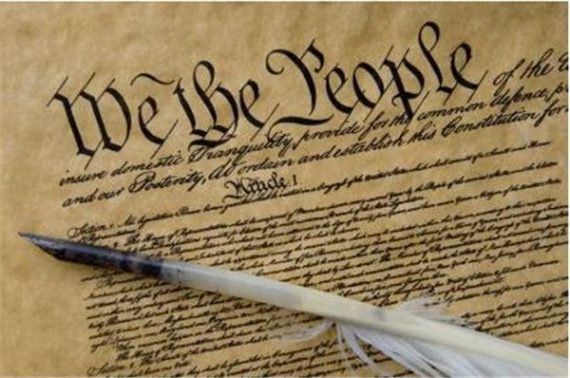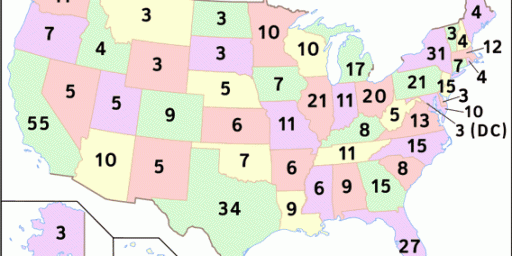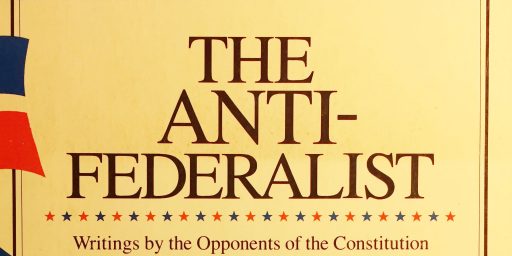What The Framers Meant
Is our Federal system a mere political compromise? Or were the Founding Fathers visionaries with a plan?
Debating whether we should repeal the 17th Amendment — a moot topic that’s so two weeks ago — Ezra Klein asserts that,
The Founders didn’t wisely orient the Senate around states. They pragmatically oriented the Senate around states. But now that we’ve been the United States of America for a while and none of the states seem likely to secede, the fact that California has 69 times more people than Wyoming but the same representation in the Senate is an offensive anachronism, at least to Californians.
Bruce McQuain retorts that this is “silly” and that, rather than being a pragmatic compromise, “It was instead, a very carefully designed system of government.” He goes on to cite Madison’s eloquent arguments for that advantages of a Federal form of government over the existing Confederal form or the alternative National form. Brian Darling concurs, saying that Klein’s view “maligns” the Founders and that his being perplexed at the veneration for them “is truly outrageous.”
Neither the view that the Framers were purely pragmatic nor the idea that they were philosopher kings is quite right. They were, instead, politicians and statesmen very much steeped in the cutting edge philosophical debates of the Enlightenment.
Of course the Great Compromise (or Connecticut Compromise, as it’s sometimes known) was a pragmatic political position. It has Compromise right in the name, after all. The representatives of the more populous states naturally wanted a system that advantaged them and were able to marshal perfectly valid Enlightenment arguments in favor of their position. Conversely, the representatives of the smaller states rightly argued that they came to the table as sovereign equals, just as would be the case in an international treaty between France and England, and that the number of citizens in a sovereign state really had nothing to do with their equality. With neither extreme able to get the necessary votes to form something better than the fallback position, the Articles of Confederation, a compromise position carried the day.
This doesn’t mean that the bicameral system that the devised to make the compromise viable wasn’t grounded in brilliant political theory. Indeed, it was. Montesquieu’s tripartite theory of separation of powers, available in English only in 1750, was fresh on their minds.
But it’s a mistake to think of the Framers as a monolith. Again, they were politicians with different beliefs and representing constituencies with different interests. Even the authors of the Federal Papers, which were originally a series of newspaper editorials arguing for the ratification of the Constitution, differed substantially amongst themselves. Additionally, it’s fair to say that the arguments contained therein were a post hoc rationalization; that is, they defended the compromise document achieved in Philadelphia, not necessarily their ideal system of government.
As to the idea that it’s “outrageous” to question the wisdom of continuing practices written onto parchment by the geniuses of 1789, it’s simply nonsense. Certainly, Jefferson, he of “refresh the tree of Liberty” fame, would scoff at the idea. They were very wise men crafting a political system to serve the needs of their time, not all-knowing oracles of the future.
We’ve already formally amended the document 27 times (18 times if one wishes to count the Bill of Rights as a single amendment) and informally amended the system created by the Framers thousands of times through judicial interpretation, neglect, and cultural change. We went, for example, from a system of appointed presidents to elected ones without amendment. We went from manhood suffrage reserved to white property owners to near universal suffrage for non-felons over 18.
As Steven Taylor correctly notes in “Repeal the 17th Amendment?” our society is radically different from the one the Framers knew. States are simply not the quasi-sovereign city states they were in 1789 and haven’t been since the Reconstruction Era. It really doesn’t make much sense for the citizens of Wyoming to have 69 times the per capita representation in the Senate as their countrymen in California. If we can get enough political support to get over the massive hurdles to amend the Constitution to change this — we can’t, by the way — then it’s no disservice to the Framers to do so.







What’s amazing is the Constitution ALWAYS appears to serve the needs and concerns of the WINNERS. The LOSERS of the elections always end up complaining. If it’s not the electoral college it’s the Senate, the 14th Amendment, or some intentionally imaginary delusion that supports their argument. There are no bigger liars than those in the modern News, or engaged as an elected official. the MEDIA propagates the lies and mythology over truth and true national needs or concerns because truth is unimportant when you are selling PAPERS.
You’re the political scientist Jim but the American constitution has always struck me as fairly typical of most watershed settlements or documents establishing a new polity in that it was a mixture of pragmatism and idealism. The document isn’t sacrosanct since it’s already been the subject of numerous amendments and the notion that the founding fathers clearly envisaged the extent of our present polity hardly seems realistic. The system is not yet under sufficient stress for the voters of CA or other populous states to start seriously questioning why they have only a fraction of the representation of voters in Wyoming. However it’s not totally inconceivable it could get to that point if the system is over abused.
It is with respect, James, that I strongly disagree. The reason that the framers came up with the idea of two senators for state as opposed to directly reflecting the population incensed eighths, was so that the power wasn’t concentrated in the eastern cities, and of course now, that would also include the far western cities.
As for the structural changes since the reconstruction as regards the role of states within this federation, perhaps you’ve hit on part of the problem, unwittingly. We shouldn’t have changed in that relationship.
At the Constitutional Convention, Madison was attributed as saying:
“Some contend that the States are sovereign, when, in fact they are only political societies. There is a gradation of power in all societies, from the lowest corporation to the highest sovereign. The states never possessed the essential rights of sovereignty. These were always vested in Congress.”
His point was that the states were artificial constructs of Britain, subject to no real power that was not of convenience to the general government and not subject to manipulation where the general government saw fit. In support of the Virginia Plan, he sought the same subservient relationship.
However it’s not totally inconceivable it could get to that point if the system is over abused.
They would need the support of the over-represented for it to happen. Some 16 states have 3 or fewer reps in the House and rely on the Senate for their representation. Not much that the big states can really do about it, is there?
The quote above is from Yates; I couldn’t find a link at first, so any typos are mine:
http://avalon.law.yale.edu/18th_century/yates.asp
“As for the structural changes since the reconstruction as regards the role of states within this federation, perhaps you’ve hit on part of the problem, unwittingly. We shouldn’t have changed in that relationship.”
Would have left us as a second rate military power. Offhand, I cannot think of any successful military empire without a fairly strong central government, though I am poorly read on the more Eastern empires like the Ottoman and Byzantine, so perhaps it can be done.
Steve
James is, of course, right that the Constitution and the Senate were part of a compromise… but it’s worth noting that they were not part of a compromise with some dreaded enemy. They were a compromise required to get everybody to approve the founding of the country. And to this day, if the populous states want the participation of the less populous states, this arrangement is crucial. The smallpop states don’t have much of any representation in the house and are negligible in the electoral college. To avoid being a nation governed by the coasts (well, not exactly with Texas and Minnesota and all that, but you get the idea) it means giving the interior states representation somewhere despite their comparatively low population.
For two of the nation’s largest states, Texas and California, there were pushes to split the states up. Neither state liked the idea despite increased Senate representation because they knew that there was an inherent power in being a large state with more people. This dynamic remains true regardless of the Senate.
Along similar lines, when admitting states, the successive presidents and congresses could have kept the states geographically large and in accordance with the population. They chose not to do so, sticking 4-degrees-by-two and trying to honor territorial culture. Despite the fact that this meant diluted senate influence. Statehood simply hasn’t been formed around the notion of “a collection of people” and rather as intended distinct political entities. It is not outrageous to me that these entities get some degree of representation apart from their respective populations.
Sure, it’s a concession that larger states would prefer not make. But the smaller states also made concessions that it did not particularly want to make.
As to the idea that it’s “outrageous” to question the wisdom of continuing practices written onto parchment by the geniuses of 1789, it’s simply nonsense.
The “modern” age always feels it is superior to the historical age, when there is very little foundation for the position. The premise of the article boils down to the idea that a populous state should have more representation than one less populous, and that this is a natural evolution of the growth of the country. This completely ignores the fact that the exact same situation existed at the time the Constitution was written, just on a lesser scale. The only difference is one of magnitude. the original thirteen colonies had enormous differences in their populations at the time the founding fathers decided upon the guidelines which would dictate the makeup of the Senate.
For example, the Commonwealth of Virginia had an estimated population of 538,000 in 1780, compared to Tennessee which had a population of 10,000. This was 8 years before the Constitution was fully ratified, so the framers must have been fully aware of the population discrepancy issue.
W. Virginia had 58 times the population of Tennessee, which is simply a slightly bigger disparity than the one cited in the article between Wyoming and California. The notion that this situation was not accounted for in the discussions prior to a decision being settled upon regarding the makeup of the Senate is more than just a bit presumptuous. As in almost every case, the founding fathers took great pains to craft a governance model that would account for the future expansion of the country’s population. They were way ahead of those who wish to second-guess them today, showing the real genius of their considerations.
Tennessee wasn’t a state at the time.
W. Virginia had 58 times the population of Tennessee, which is simply a slightly bigger disparity than the one cited in the article between Wyoming and California.
That’s kind of a poor example given that neither West Virginia nor Tennessee were states at the time of the founding. Further, according to Wikipedia, Tennessee’s population in 1790 (35k) was a little less than 1/20th that of the combined Virginia population (750k). That difference collapsed to over 1/9th by 1800. So I’m not sure where you’re coming from here.
That only matters if you believe the states matter. Removing the Senate and going with just the House — or some other population-based districting system — would render each citizen equal. To the extent we’d be dominated by the people in the big cities, it would be a function of 1) more people living there and 2) their voting as a bloc.
But, in the case of the Electoral College, we’d actually re-enfranchise the vast number of people who live in non-swing states. A Republican living in California not only effectively has no presidential vote but in effect is forced to vote for the Democrat.
I think filibusters, holds, etc. have given far more power to small state Senators than the Founders intended.
That only matters if you believe the states matter.
Sure, but while a case can be made that the US has culturally gone from a plural to a singular, the notion of states as irrelevant represents a pretty major shift in thought. States have not historically been solely an administrative collections of people. They have their own governments, own histories, and own identities. When states were organized, the first question was not “how do we make them equal in population”?
I have no huge attachment to the EC. The main reason I don’t want to see it go is that it lends credence to the notion of states as irrelevant, which I just don’t agree with. As long as we’re debating the EC, we’re not debating the existence of the Senate.
I believe we are talking about what to do today regarding representation in Congess. If I am not mistaken, today we have 50 sovereign states that have their own Constitutions, and clear borders within the nation. The states have significant populations. Any thought of revising borders or breaking up states is not going anywhere. Nor will attempts to rebalance the Senate go anywhere, I believe. The problem really resides within the political control structures and rules within each house, and how to ensure fairness across the board in legislation affecting many states.
One gets the impression that Senators and Representatives are basically captives of their staffs, since they haven’t recently even had the time to read the important bills before they were passed. Here lies the possibility for much collusion and evil under the table or behind the backs of elected representatives, so to speak, IMO.
Then too, there are an enormous number of committees with overlapping interests and considerable power in creating bills, delaying bills, approving bills, and funding bills, all unspoken about in the Constitution. Much could be done to clean all of this up without the need to go through the amendment process at all. It appears to me that the smaller states lose out in these situations because they are politically weak. This could possibly be rectified by some scheme or another, but good luck with the pols.
I continue to believe that the fundamental structure of the Constitution is sound. It is these subsidiary, necessary, yet flawed machinations to implement what the Constitution demands that get us in trouble, both in Congress, the Administration, and the Judiciary.
To implement or to avoid…I should add.
The Convention delegates were thinking about Tennessee. There was a proposal to cap representation in new Western states at no more than the representation of the original 13 colonies. The proposal was beaten back either from principle or due to a sense of obligation from the colonies with large backcountry territory.
I’m a little surprised that no one has mentioned one of they key reasons why our representative government is set up the way it is. Yes, I know it’s not fashionable among our right-leaning brothers to acknowledge our founders’ imperfections, but most of these compromises had to be made because several of our states insisted they had the God-given right to enslave other human beings. To attempt to discuss the reasons why small states have large power without that fact is simply absurd…
That’s kind of a poor example given that neither West Virginia nor Tennessee were states at the time of the founding.
Yes, you are right that they were not states at the time; Tennessee became a state 7 years after the Constitution was ratified. I don’t think that excludes the principle since you would have to think that the founders didn’t envision any of the territories becoming states. If it makes you feel better, use Deleware as an example then; Virginia still had 10 times the population as Deleware. Again, the principle is the same, it’s just an order of magnitude. To believe that the founders didn’t account for population differences between states when they decided on a 2 -Senator standard is simply not credible.
Ahem, that would be Delaware, not Deleware. A thousand pardons…
It is certainly true that it hadn’t been done in the past, but then neither had an experiment the size and scope and design of what came to be known as these United States, either.
The irony, here, of course is that so much of the left would have approved of us being a second rate military power.
> The irony, here, of course is that so much of the left would have approved of us being a second rate military power.
Sure bit sure. And you would approve of a police state in America. See how easy it is to make lame generalizations about those who’s politics you disagree with? Since we are discussing the ideas of geniuses here, you might want to try and bring a few more brain cells online.
@ anjin
See how easy it is to make lame generalizations about those who’s politics you disagree with?
Says anjin, as the Democrats look at cutting more defense spending, before cutting entitlements, in order to claim they are fiscally conservative .
http://thehill.com/homenews/house/105195-liberals-battle-on-defense-budget-hits-turning-point
June 24, 2010
House Majority Leader Steny Hoyer (D-Md.) put the once-sacrosanct defense budget on the chopping block this week by stating that Pentagon spending cannot be excluded from deficit-reduction talks. In prior years, such a floated proposal would have been shot down immediately.
Brain cells on standby, awaiting liberal overlord instructions… Sir!
Most of the Continental countries with big population faced secession war once or more. In Mexico, Yucatan, Coahuila, Nuevo León, and Tamaulipas tried to secede from the US, besides Texas and California. Most of the states in Brazil tried secession several times(Including a bizarre rebellion of Muslims slaves that tried to create a caliphate in the state of Bahia). It´s very difficult to keep a bunch of states together precisely because the regional elites does not want to cede power to another government. That´s why federalism was created and that´s why the Framers adopted it.
> Says anjin, as the Democrats look at cutting more defense spending
Possibly because we are spending more on “defense” than the rest of the world combined. Meanwhile, the infrastructure of our country continues to crumble, American kids go to crappy schools, and tens of millions of American children have no health care insurance.
Perhaps you should refer back to the wise words of President Eisenhower on the subject. But hey, I am sure that Glenn Beck and Sarah Palin know far more about the subject than Eisenhower ever did.
Here are a few quotes from President Eisenhower, an American who lived honor instead of simply talking about it when the cameras are running:
We will bankrupt ourselves in the vain search for absolute security.
In the councils of government, we must guard against the acquisition of unwarranted influence, whether sought or unsought, by the military-industrial complex. The potential for the disastrous rise of misplaced power exists and will persist.
When people speak to you about a preventive war, you tell them to go and fight it. After my experience, I have come to hate war.
Disarmament, with mutual honor and confidence, is a continuing imperative.
Every gun that is made, every warship launched, every rocket fired, signifies in the final sense a theft from those who hunger and are not fed, those who are cold and are not clothed.
Here in America we are descended in blood and in spirit from revolutionists and rebels – men and women who dare to dissent from accepted doctrine. As their heirs, may we never confuse honest dissent with disloyal subversion.
How far you can go without destroying from within what you are trying to defend from without?
I hate war as only a soldier who has lived it can, only as one who has seen its brutality, its futility, its stupidity.
I like to believe that people in the long run are going to do more to promote peace than our governments. Indeed, I think that people want peace so much that one of these days governments had better get out of the way and let them have it.
Only Americans can hurt America.
Peace and justice are two sides of the same coin.
The purpose is clear. It is safety with solvency. The country is entitled to both.
This world of ours… must avoid becoming a community of dreadful fear and hate, and be, instead, a proud confederation of mutual trust and respect.
Count the stars skippy. If you can count that high, that is.
http://en.wikipedia.org/wiki/File:Dwight_D._Eisenhower_as_General_of_the_Army_crop.jpg
This discussion is only taking place because of the increasing sense of gridlock in Washington. I certainly don’t think it’s at a critical stage in terms of calling into question our electoral arrangements but that the questions are even being asked is itself not without significance. Whether it mestastasizes into something bigger depends on whether gridlock continues and starts producing results the majority don’t like. There have been other periods of prolonged semi gridlock (from around 1870 to depending on your view the thirties or the sixties) when a coalition of southerners and nothern conservatives blocked action on numerous issues. In today’s climate the public would not tolerate that sort of stasis, so ultimately the politicians have to get the system working again or public opinion will start seriously questioning our constitutional arrangements.
Ummm… no… which is why I don’t support Leftists. Every time the left has power government grows. Examples: The police state now encompass healthcare, what we drive, and how much water our toilets can use.
Go Ahead; tell us it’s all Bush’s fault.
The point that you seem intent on neglecting is that the defense is a constitutionally mandated function of our government. The remainder are not.
Yeah, getting 3/5 of the states on board would certainly pose a problem given that at least 1/4 of them would be voting to reduce their power in Washington.
When you guys have beaten every word, sentence and concept out of the Constitution, the founders papers and the opinions of concerned political scientists and government wogs, there still standa a nation, a Constitution in being, and an elected government.
We need to move forward, not backward in looking for rational improvements to promote. In moving forward, I suggest that preserving the current superstructure and checks and balances makes a lot of sense. We need to come in underneath these structures and modernize their workings.